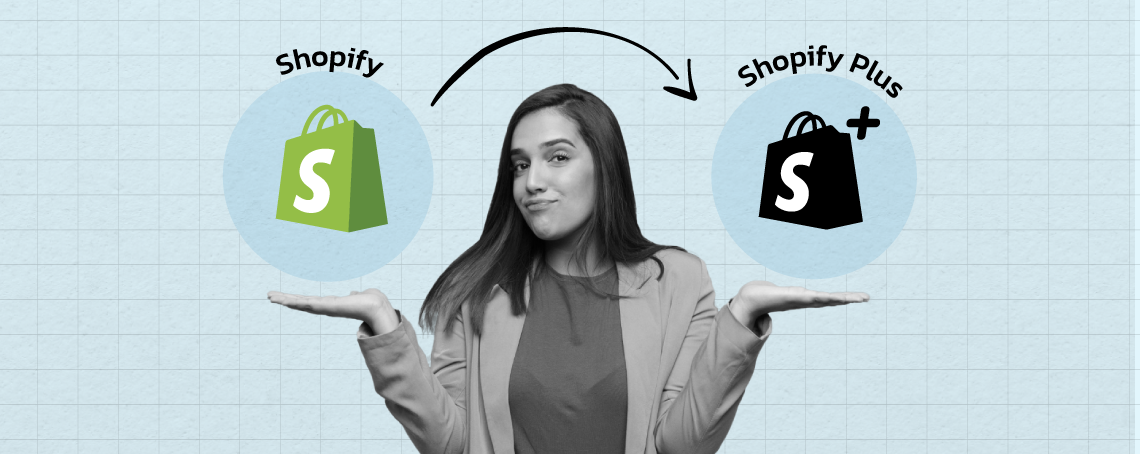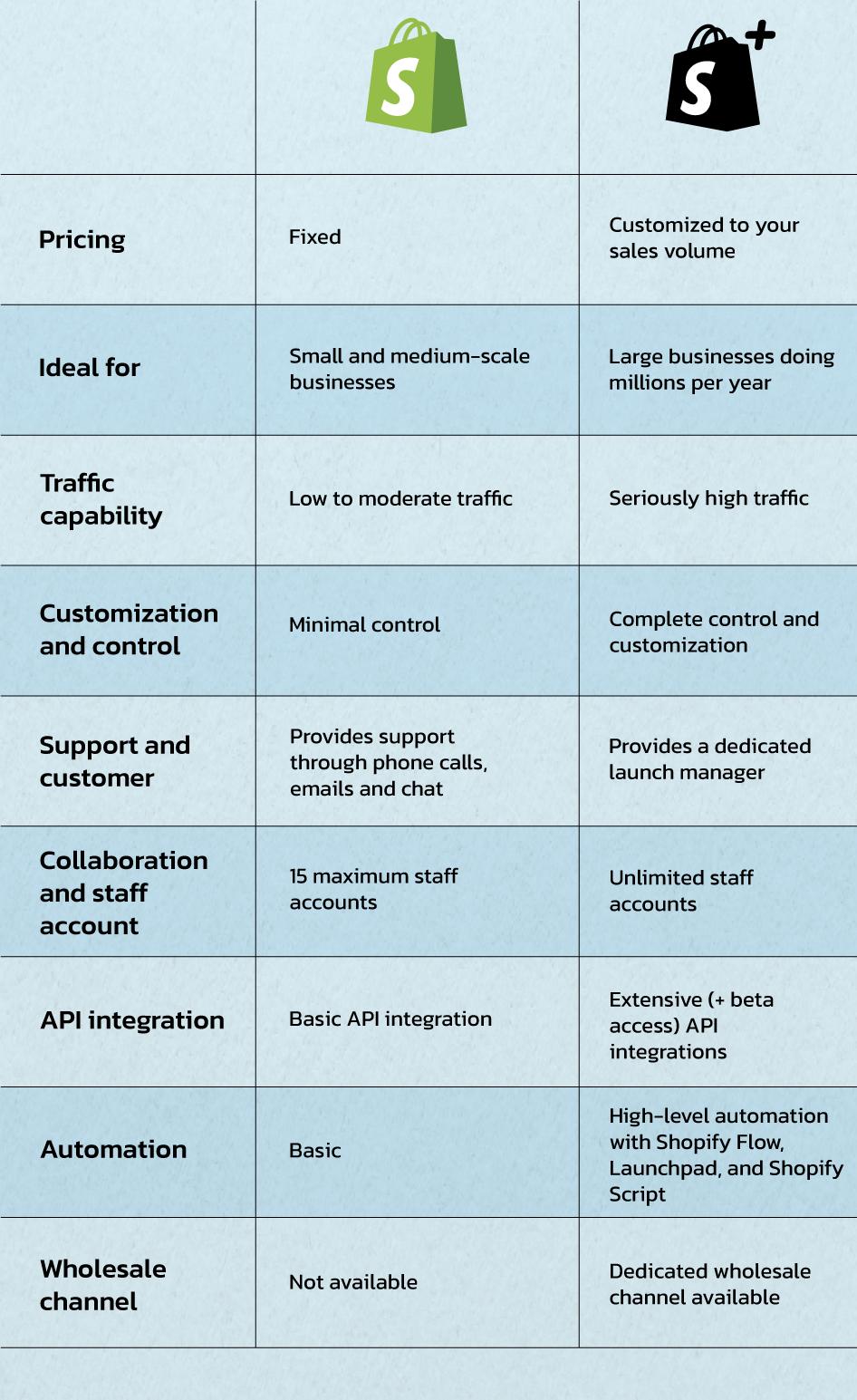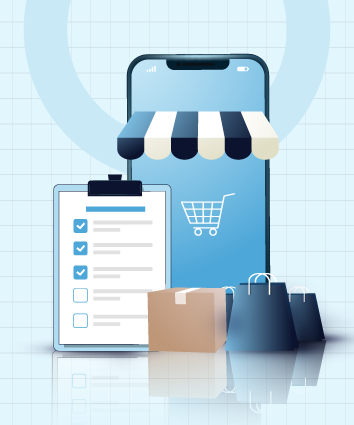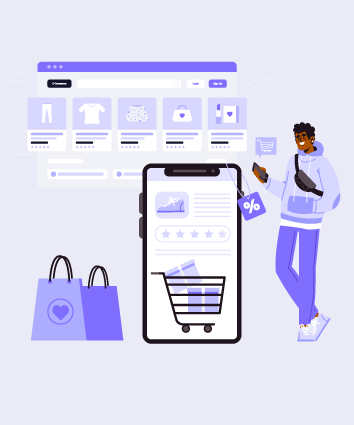Shopify Vs. Shopify Plus: What You Need to Know Before Upgrading

As a growing e-commerce entrepreneur, choosing between Shopify and Shopify Plus might seem daunting. With both platforms offering robust capabilities tailored towards scaling your business, understanding what sets them apart can help determine whether upgrading is worthwhile for your needs.
And before you go for your store’s Shopify development, we have provided the complete breakdown of Shopify vs Shopify Plus.
According to data compiled by BuiltWith*As of January 2023, approximately 578k active websites were running on Shopify compared to roughly 45.9k sites hosted on Shopify Plus. That massive gap speaks volumes regarding the latter being geared primarily towards high-volume sellers seeking enterprise-level functionalities.
Critical Differences Between Shopify and Shopify Plus

While both platforms share many similar attributes underpinning the seamless operation of your online shop, here’s a closer look into each platform’s features and notable differences.
Let’s dive right into the discussion of Shopify Vs. Shopify Plus.
1. Pricing Breakdown
In terms of pricing, Shopify and Shopify Plus differ significantly from one another. Here is an overview of their plans and costs, from essential to advanced tiers.
Shopify Plans:
Basic Plans: (9$ per month billed annually)
This plan includes all essential features, such as unlimited products, storage, bandwidth, etc.
Shopify Plan: (39$ per month billed annually)
This plan adds the ability to create specific product variants, including different colours and materials, plus real-time shipping rates. It also includes abandoned cart recovery and discount codes without contacting app developers directly. Additionally, this tier provides priority phone and email support through the Partner Success Program. The only limitation is its need for an advanced report builder.
Advanced Shopify Plan ($1,268/year):
Targeting larger stores, this package has everything in lower-tier plans, plus a developer account providing private apps and APIs. Notably, it offers a dedicated technical account manager who will ensure efficient store performance across multiple locations. Furthermore, this plan boasts advanced report builders allowing users to segment individual metrics at scale. While still reasonably priced, higher fees come with greater accessibility and dedicated resources.
Shopify Plus Plans:
a) Enterprise Plans (1,498−3,498 per month): Customized entirely around client needs, these packages require negotiation due to their fully bespoke nature. They include exclusive features not accessible to other merchants, such as Prioritized Safe charge Payment Services, 100% uptime guarantee SLA credits, and managed services delivering infrastructure updates. These plans offer white glove treatment ensuring top optimization levels for clients ranging from 1M to 5M+ annual revenue.
2. Merchant Profile
Comparing typical merchants fitting well under each umbrella helps determine which platform aligns best with your growing venture. Here we outline characteristics distinguishing different profiles utilizing one over another:
Shopify:
Small Business Entrepreneur: Frequently appealing to startup founders needing more substantial resources or those running micro-operations focused on side hustles with minimal monetary risk exposures.
Limited budgets often force cost-effective solutions prioritizing simplicity over extensive functionality expansions better suited for expanding larger organizations.
Digital Marketer: Many individuals leveraging dropshipping models to test new ideas or supplement other income sources fall into this category. By reselling products without holding inventory but instead letting manufacturer warehouses shoulder fulfilment responsibilities, their minimal commitment capitalizes upon others’ logistics expertise.
Their need for simplified storefront management alongside automation or app integrations optimizing routine tasks benefits significantly from basic plus advanced app stores allowing easy third-party plugin installation/configuration integration alongside a visual website builder covering design essentials for non-technically inclined users.
Shopify Plus:
Enterprise Level Executives Managing Global Supply Chains: Targeting decision makers responsible for controlling sprawling international trade portfolios requires versatile platforms coping with multiple currencies, tax regulations, language localizations, pricing nuances, diverse shipping considerations, etc., demanding intricate management of complex global supply chains necessitating comprehensive reporting dashboards aggregating crucial KPI insights across distributed stakeholders.
Shopify Plus additionally offers specific advantages addressing these key players’ needs through additional features like:
Multi-Location Inventory Management Tools: Efficient tracking of stock levels spread out among numerous physical locations or separate virtual warehouses worldwide facilitates centralized oversight, minimizing confusion otherwise leading to misallocated items, wasted time, excess transport costs, or unfulfilled orders due to inventory discrepancies.
Advanced Reporting Suites & Analytics Insights: Customizable dashboard creation showcasing essential metrics monitoring performance health indicators helps executives understand how their companies fare against industry benchmarks pinpointing areas requiring optimization focus.
Granular access controls allow adjustable permissions setting restrictions based on job roles determining who glimpses confidential internal figures safeguarding sensitive financial information security.
Robust API Integrations Supporting Third-Party Software Compatibility: Connecting external services bolstering native apps’ limitations accommodates specialized programs satisfying niche industry peculiarities or proprietary systems tailored to individual corporate processes improving operational efficiencies and workflows.
International Payment Gateway Choices Accepting Multiple Currency Processing Options: Offering multi-currency support permitting transactions denominated in various national tender units enables easier conversion rate reconciliations when calculating exchange rates between different currencies, therefore reducing administrative burdens linked to manual conversions and currency fluctuations potentially upsetting budgets unprepared for unexpected changes.
Additionally, Shopify Plus boasts built-in translations supporting languages popular throughout various regions, adapting user interfaces accordingly, helping businesses target multilingual clientships more effectively resonate with diverse cultural background preferences and promoting brand loyalty via personalization reflecting unique customer affinities across various geographies speaking their mother tongues.
Enhanced B2B Functionality: Expanded Business-to-Business transactional capacities incorporate dedicated features focusing on enormous enterprise demands, such as quote generation tools generating formal estimates specifying line-item descriptions, including custom quantities or variable price points according to predefined conditions satisfying extensive contract negotiations. Moreover, bulk ordering procedures concentrate on volume discount structures addressing wholesale partnerships emphasizing group purchases offering tiered incentives based upon quantity thresholds encouraging more prominent buyers to maintain longer-term relationships and boosting sales volumes.
Elite Fraud Protection & Risk Management Services: To help combat fraudulent activities threatening online marketplaces or credit card processing gateways, added security enhancements provide cutting-edge technologies analyzing user behaviour patterns flagging suspicious activity empowering retailers to act swiftly, intercepting any potential breaches before actual losses materialize. Insurance protection also shields merchants facing chargeback penalties who suffer from accidentally approving fraud instances by mistake since humans sometimes err, misjudging authentic buyers’ trustworthiness.
3. Key Features
Now let’s dive deeper into additional standout features distinctively available in either platform. While they might seem similar at first glance, here are some key capabilities setting them apart:
Shopify:
Product Variants: Allows creating customizable versions of your items featuring adjustable attributes like colour, size, or material composition. This can enhance user experiences by encouraging more tailored selections. By offering these variant types outright or when stock runs low, consumers enjoy flexibility matching preferences better than simple preset options would allow. Consequently, brands may see increased sales volume rather than losing potential buyers because of limited inventory choices.
Gift Card Functionality: With numerous third-party providers integrated alongside native tools permitting digital voucher generation, issuing physical plastic cards, or implementing virtual eCodes, users gain comprehensive options for generating flexible branded gifts perfect for reward programs or impromptu purchases alike.
Print Fulfillment Network: Shopify users benefit from streamlined partnerships enabling print fulfilment orders to be handled automatically once received. This frees up sellers’ time manually uploading files or arranging production details before initiating subsequent steps toward successful order delivery. Focusing on managing business growth instead allows entrepreneurs to stay ahead competitively.
Online Marketplace Listings: Merchants can choose from many software connectors linking their wares to existing online platforms. For example, vendors wishing to list goods on Amazon Handmade or Buy Button extensions may do so quickly, thanks to streamlined plugins reducing implementation friction. Utilizing ready-to-go solutions eliminates barriers to entry since technical knowledge requirements become less restrictive than doing a manual setup yourself.
Shopify Plus:
Elite Billing and Discount Rules: Benefiting big enterprises requiring high-level service commodification and support structures built around their unique company demands, the Shopify Plus solution empowers elite billers via various means geared towards large business success:
Personal Billing Manager: An experienced professional contacts your team to learn requirements better upon signup. Ensuring prompt responses align perfectly with your corporate objectives keeps everyone updated regarding future scalability discussions. The assigned manager remains your primary point of contact, handling any questions or concerns until reaching designated milestones deserving of escalated attention beyond their current capabilities.
Enhanced Discount Rules Configuration: Adjusting coupon code applications based on spending thresholds or targeting particular customer groups utilize upgraded functionalities surpassing standard promo code generators. Fine-tuned rules enable wider market reach via strategic customer retention and acquisition tactics using personalized savings opportunities.
Both Shopify and Shopify Plus share common core functionalities required by most vendors, such as product visibility and payment processing. Meanwhile, each option caters to varying merchant sizes with corresponding additions designed to optimize workflows and maximize overall efficiency.
While the Shopify Plus solution may feel too expensive or unnecessary for small startups already struggling financially, understanding where your company sits within its life cycle must precede decisions impacting long-term viability. Purchasing what makes sense now yet planning for scaling later keeps adaptability intact, ensuring optimal ROIs across growth stages should investments pay off, eventually mandating superior feature sets worth considering carefully.
Why Do You Need to Go for Shopify Plus Development?
There are several reasons why a business person may want to upgrade to Shopify Plus. Some of these include:
1. Need For More Powerful Features And Capabilities
As your business grows and expands its offerings, you may need more powerful features and capabilities than in lower-tier plans. Shopify Plus provides access to advanced functionalities specifically designed to meet the needs of larger enterprises, making it an ideal choice for scaling businesses.
2. Greater Control Over Branding And Design
With Shopify Plus, you gain greater control over your store’s branding and design. You can modify templates, add custom CSS, and even create custom themes. This allows you to fully align your online presence with your overall brand strategy.
3. Access To Better Customer Service
Upgrading to Shopify Plus means getting priority access to better customer service support. This includes faster response times, proactive account reviews, and white glove treatment overall.
4. Higher Limits on Orders and Sales Volume
Shopify Plus customers benefit from higher orders and sales volume limits than those using lower-tier plans. This makes it well-suited for high-growth, high-volume businesses looking to scale quickly without hitting hard limits.
5. Ability To Meet Strict Industry Regulations
Many industries have strict regulatory requirements for payment gateway integrations, PCI compliance, and GDPR data privacy concerns. A platform capable of meeting these requirements becomes necessary at a certain point in a company’s development path. Shopify Plus has all this covered, so business owners don’t have to worry about liability risks while trying to grow.
Wrap Up
So, that was it from our end regarding Shopify vs Shopify Plus. If you’re considering whether to upgrade from Shopify to Shopify Plus or whether to choose one over the other initially, we recommend consulting directly with us at NFlow Tech.
Our experienced team members specialize in crafting seamless eCommerce development experiences tailored to our client’s unique visions and goals. We know the technical details and will work closely with you throughout each implementation phase to ensure success as a strong digital partner. Let us take care of all your Shopify Plus development needs!







